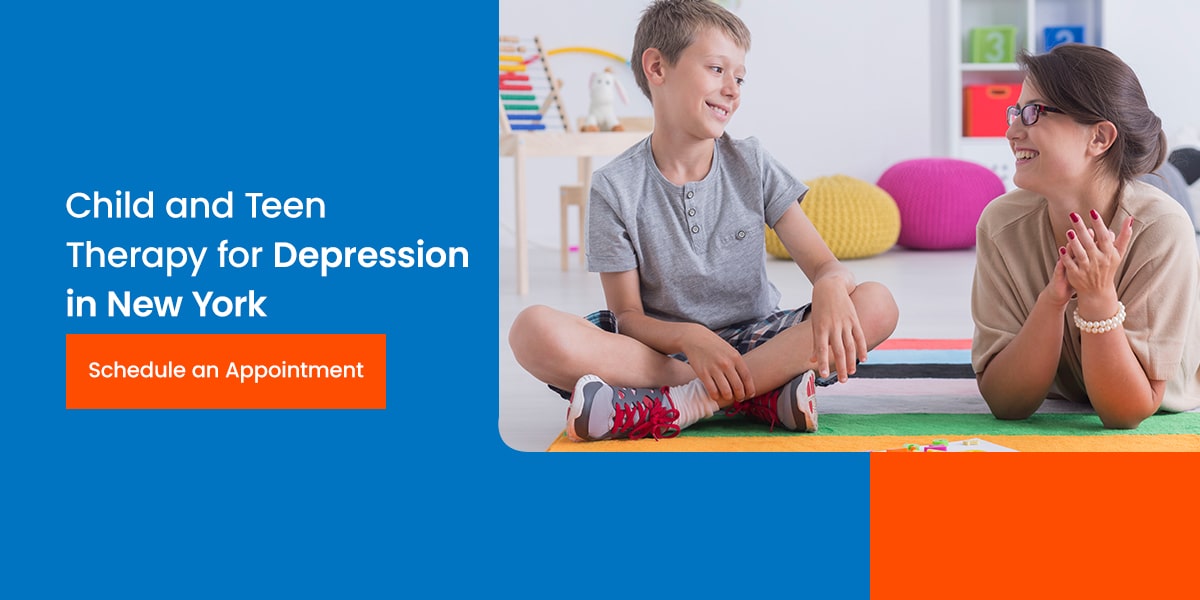Treatment for Child Depression
Find solace for your child with Depression Therapy. Schedule an appointment today.
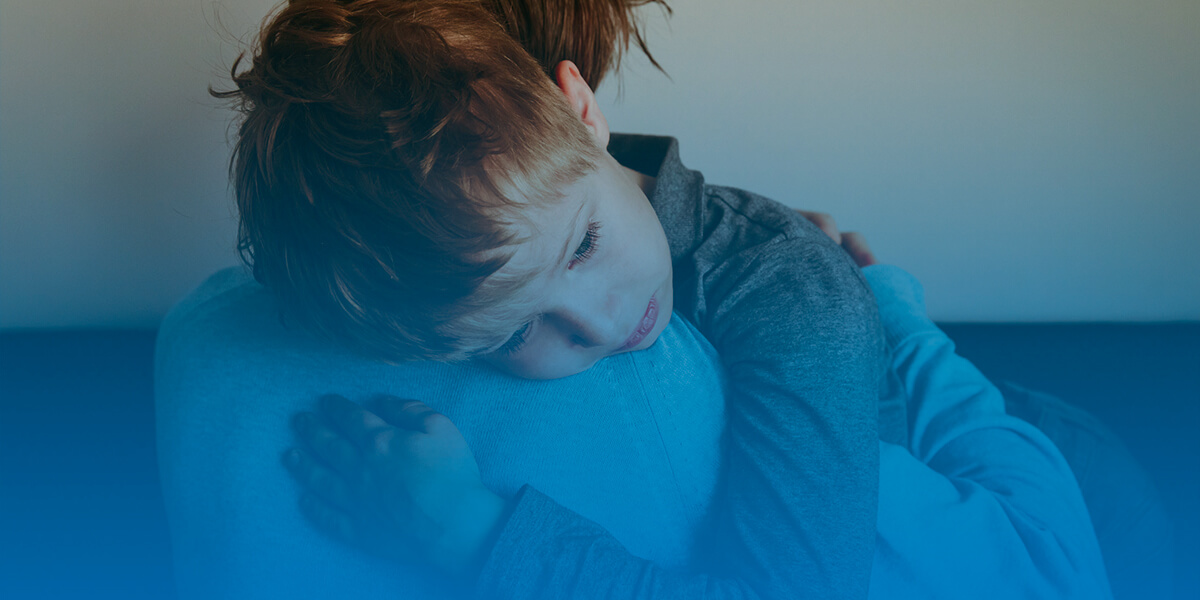
Therapy for Children With Depression
As a parent, knowing the signs of depression in children can help detect a shift in your child’s happiness, daily routines and overall mood. Every child’s depression can appear different on the outside, and taking the necessary steps to seek treatment for your loved one is vital for hearing their thoughts and validating their feelings. This process can be a long journey for you and your child, but you are not alone!
Learn the common signs of depression in children and teenagers and where to seek depression treatment for kids.
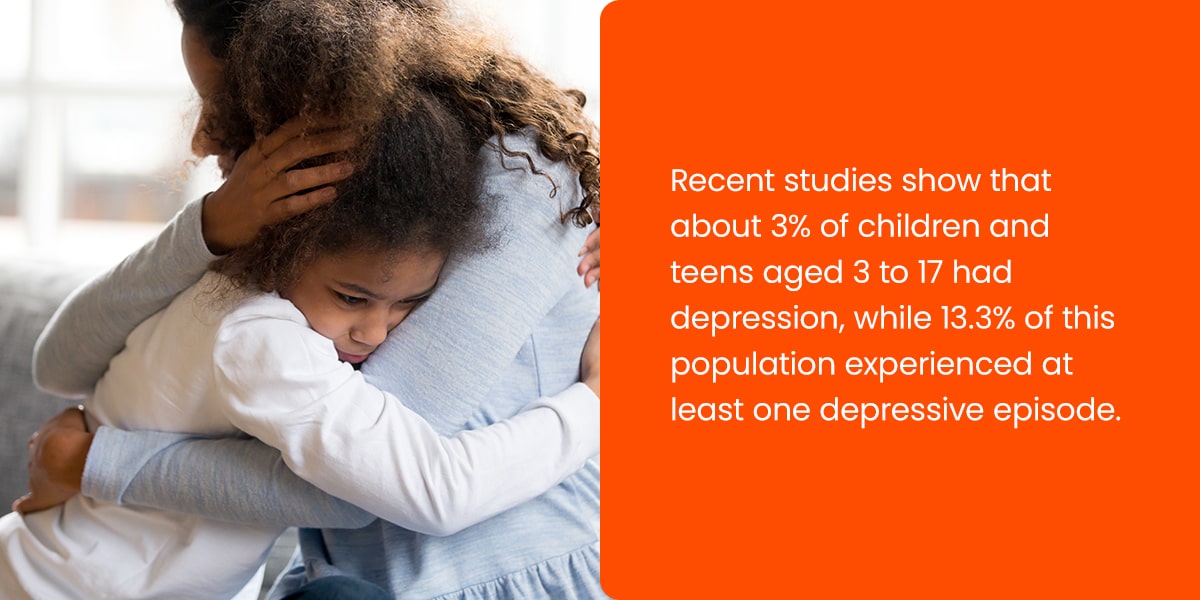
Signs of Depression
Depression is a mood disorder that can impact individuals of any age, including younger children and teenagers. Children have the potential to fly under the radar of a depression diagnosis due to the similarity in tantrums and shyness relating to the common symptoms of this mood disorder.
Recent studies show that about 3% of children and teens aged 3 to 17 had depression, while 13.3% of this population experienced at least one depressive episode. This small number of reported cases of depression could result from unknown symptoms of this mood disorder, so understanding what depression can look like is the first step to seeking the right support for your child.
The most common symptoms of depression in children and teenagers include:
- Drastic mood changes.
- Disinterest in favorite hobbies and activities.
- Behavioral problems at school, such as acting out or failing grades.
- Feeling general hopelessness or sadness.
- Fewer interactions with friends and family.
- Low energy.
- Changes in sleeping and eating habits.
- Increasing irritability or aggression.
Depression can look different for every child. While your loved one may not show every sign of depression, try to monitor any drastic changes in behavior to see if child therapy for depression is the best route for their overall health and happiness.
Try to keep in mind that children and teenagers may have a more challenging time expressing their feelings in words, so they can experience depression differently than adults. Even just letting them know you love and support them lets them know they are not alone, and help is right around the corner in the form of therapy for child depression.
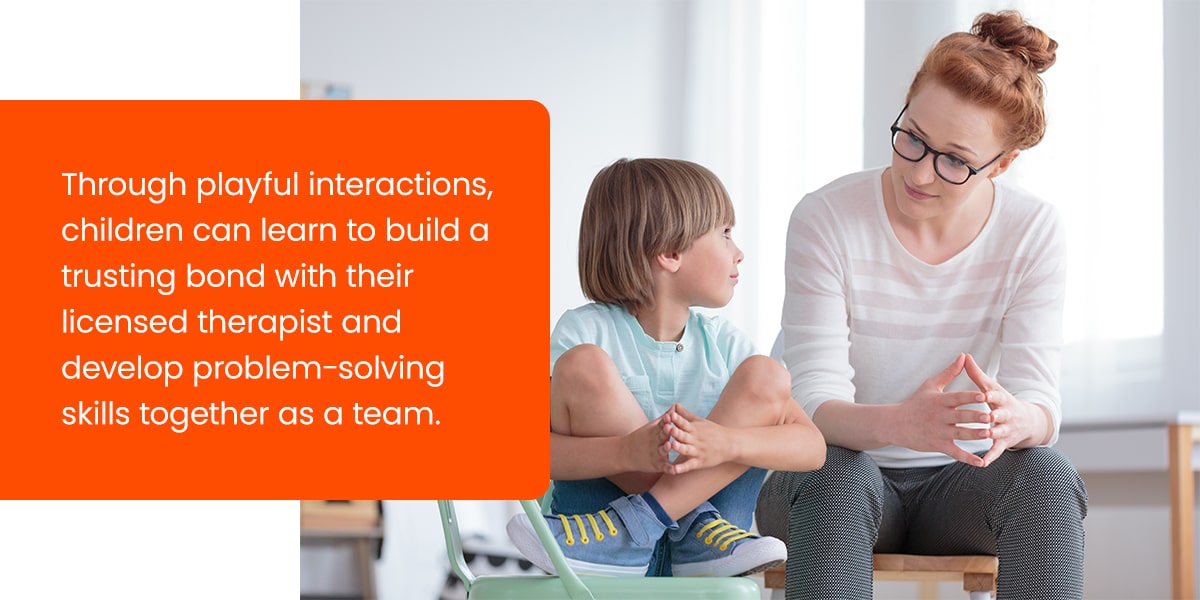
What Is Children's Therapy for Depression Like?
Therapy is not a one-size-fits-all type of treatment. Every child reacts differently to counseling approaches, and sometimes getting started on the process of therapy can open the door to better options available to help them recover from depression.
Child counseling for depression starts like most interactions with younger children. Through playful interactions, children can learn to build a trusting bond with their licensed therapist and develop problem-solving skills together as a team. Communication, experimentation and working through problems with an adult during child therapy can create healthy habits and decision-making when depressive thoughts arise.
Over time, your child can begin to feel happier when they feel in control of any problem they face head-on, creating more opportunities to strengthen relationships with family and friends.
What Is Therapy for Teenage Depression Like?
Teen therapy differs from child counseling, giving teenagers opportunities to open up to a trusted therapist about their feelings and experiences at school, at home and in social activities. Communication is one of the most vital aspects of therapy for teenage depression since they may feel like they can’t discuss their thoughts openly with others in their day-to-day lives.
During teen therapy, your child can discuss their depressive thoughts with their licensed therapist and begin exploring the deeper roots of these feelings. Exploring the possibilities of where their depression comes from allows for a more directed approach to healthy habits and mental health treatments that fit their goal for happiness.
Teen therapy aims to provide the tools each child needs to maintain a healthy relationship with their mental health and feel empowered through higher self-esteem and problem-solving skills.
Counseling Steps That Lead to Healing
A fresh perspective on life can offer a more positive outlook for children and teens with depression or anxiety as they think of the future. Therapy for these common symptoms that can influence negative thoughts can lead to chances for growing and developing problem-solving skills in productive ways to combat depression.
All it takes is a few steps that encourage your child to grow mentally and build their confidence toward a bright future. Take a look at the following goals in kids’ therapy for depression that can benefit your child’s outlook on life one step at a time.
1. Addressing Their Thoughts
As a child struggles with depressive thoughts, they tend to avoid situations that make them feel worse. As they avoid uncomfortable situations, feelings of incompetence and worthlessness increase. The negative feedback in their mind becomes a vicious cycle of depressive and anxious thoughts, falsely confirmed by the external pressures mounting around them.
Addressing anxiety and depression simultaneously helps break the cycle. It’s essential for children to feel validated when facing longstanding negative thoughts. This problem may have been going on for years unaddressed.
In therapy, we will address the thoughts and behaviors that continue to have devastating effects on their lives by understanding their origin and how they manifest in daily situations.
Then, we will discover how to diminish their importance and increase positive feedback and action to move forward.
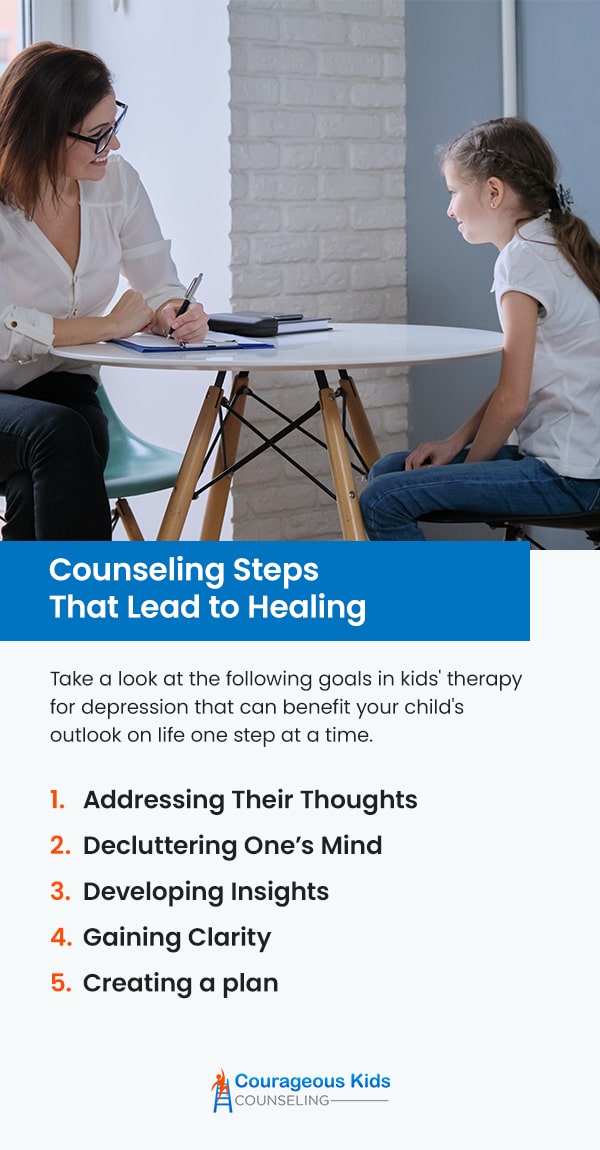
2. Decluttering One’s Mind
It can feel challenging to clean up the mess of negative emotions swimming inside one’s mind when they’ve been there for so long. Many children find it easier to let it all go and sit comfortably in a mess.
Once we start picking things apart, we recognize how negative thoughts arise, what keeps them relevant and positive attributes that can take priority. Once we begin to bring order to their mind, we can start to form a plan to bring positive thoughts to the surface.
3. Developing Insights
Once some order is restored, a child can begin to understand the importance of prioritizing positive thoughts and emotions.
They begin to understand the negative ones bring them deeper into despair, and the positive thoughts move them closer to what they want.
4. Gaining Clarity
A child living with depression does not know what it feels like to be whole and complete. As things become clearer, negativity, sadness and depression become undesirable and obsolete. Instead, they have a vision for the future, which looks more optimistic than depressive symptoms tell them otherwise.
5. Creating a plan
Depression may have been living in your child for quite some time, making itself relevant. However, its foothold can wither with supportive counseling. Once we can give a name to depressive thoughts, we can discover how to make them less relevant for your child.
In depression treatment, we will discover your child’s strengths that will help them defeat depression’s reign. And anytime the thoughts creep in, we will challenge them by successfully recognizing all the steps they take toward getting their life to a positive and fulfilling place.
Child and Teen Therapy for Depression in New York
Reach new heights for your child’s happiness and confidence at Courageous Kids Counseling! In our work together, we will uncover what’s holding your child back in worry and despair and how we can help them move toward a place of happiness and fulfillment. We have convenient online sessions to make them feel as comfortable as possible during each meeting time to progress toward a future of positive mental health.
At Courageous Kids Counseling’s child and teen counseling, we value the importance of empowering strong family bonds so your child can discuss their thoughts outside of each session with you or another loved one. We are happy to take calls outside of your child’s appointments to address any of their symptoms to make sure their next session is productive toward new goals for their mental health!
Schedule a child therapy appointment today to begin the road to happiness for your loved one.
Want to know where to start?
In our work together, we will uncover what is missing from your child’s life, what’s holding them back in worry and despair, and what are the ways we can help them move toward a place of happiness and fulfillment.
We provide convenient online sessions.
Schedule An AppointmentContact Us
